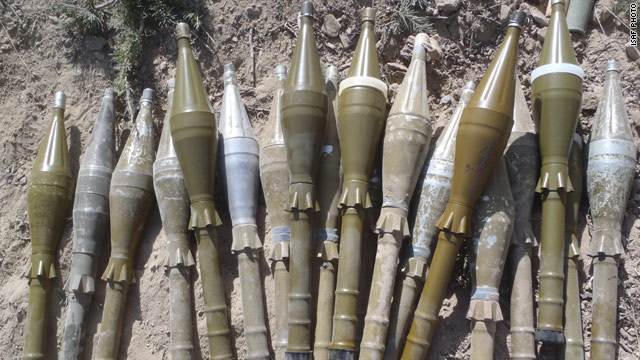 On 2 April 2013, the General Assembly adopted the landmark Arms Trade Treaty (ATT), regulating the international trade in conventional arms, from small arms to battle tanks, combat aircraft and warships. The treaty will foster peace and security by putting a stop to destabilizing arms flows to conflict regions. It will prevent human rights abusers and violators of the law of war from being supplied with arms. And it will help keep warlords, pirates, and gangs from acquiring these deadly tools.
On 2 April 2013, the General Assembly adopted the landmark Arms Trade Treaty (ATT), regulating the international trade in conventional arms, from small arms to battle tanks, combat aircraft and warships. The treaty will foster peace and security by putting a stop to destabilizing arms flows to conflict regions. It will prevent human rights abusers and violators of the law of war from being supplied with arms. And it will help keep warlords, pirates, and gangs from acquiring these deadly tools.
Towards entry into force
- How many States have signed the Treaty? 108
- How many States have ratified the Treaty? 7
- General Assembly vote to Adopt the Treaty: 154-3-23
- Letter from the High Representative, Ms. Kane to Member States
English Français Español - How to sign / ratify: a step-by-step guide:

Secretary of State John Kerry shakes hands with Miguel de Serpa Soares of Portugal after signing the U.N. Arms Trade Treaty in New York City on Sept. 25, 2013 Read more: http://world.time.com/2013/09/26/the-real-news-at-the-u-n-u-s-signs-arms-trade-treaty/#ixzz2g1TTzPVA (Andrew Gombert / EPA via @TIME
Analysis of the ATT’s signature by the US b
The Real News at the U.N.: U.S. Signs Arms Trade Treaty (Time Magazine, Sep. 26, 2013)
Hear where the idea of a global arms trade treaty first came from: http://ow.ly/oa4wN #armstreaty#humanrights
 U.S. keeping dubious company over arms treaty
U.S. keeping dubious company over arms treaty
For more What in the World, watch GPS, Sundays at 10 a.m. and 1 p.m. ET on CNN
By Fareed Zakaria Global Public Square staff
Amid all of Washington’s discussions on Syria and Iran, one other issue seems to have gotten ignored. The U.S. signed an actual international treaty this month, one with vast implications for terrorism and war around the world. The problem is…the treaty needs to be ratified by the U.S. Senate – and that’s just not going to happen.
Let us explain.
It’s the U.N. Arms Trade Treaty – an agreement that aims to control the $70 billion global trade of weapons. Almost every major commodity is subject to some form of international regulation – gold, oil, currencies. But there have been few controls on the flow of weaponry. Countries have wanted to have an unregulated free-for-all in the weapons market. And we are not just talking about guns.
The U.N. treaty covers battle tanks, combat aircraft, attack helicopters, warships. These are all weapons that are playing a part in ongoing wars in Syria and large parts of Africa. As Nigeria’s President Goodluck Jonathan put it last week, these are the true «weapons of mass destruction» as much as the chemical weapons that were used in Syria last month. And yet everyone – including rogue states, militias, and terrorist groups – seem to have unfettered access to them.
The key part of the U.N. treaty is that it asks signatories not to export weapons to groups or states that could use these weapons in crimes against humanity. Simple enough – don’t send arms to Syria or Sudan or North Korea.
Who could object to this?… MORE
Don’t Arm Thy Neighbor
By ÓSCAR ARIAS SÁNCHEZ
Published: October 23, 2013
SAN JOSÉ, Costa Rica — I am not one of those who believe the United States’ days of world leadership are behind us. All my life I have been an admirer of our northern neighbor. I believe its strengths — its democracy, its founders’ wisdom, its people’s ingenuity and diversity — give it unique authority in the world. But many of its citizens and their leaders seem to take such authority for granted now, as if it were American property. The truth is, it must be earned, and today the United States is passing up opportunities to earn it.
The Arms Trade Treaty, approved by the United Nations in April, is one such opportunity, and it must not be allowed to slip by. Last month, Secretary of State John Kerry signed it. Given the enormous presence of the United States in the international arms market, the treaty’s ratification, which requires a vote of two-thirds of the Senate, is essential to its success.
But the treaty will face stiff opposition. Two Republican Senators, James Inhofe and Jerry Moran, have gleefully pronounced the treaty “dead on arrival” and argue that the United States should not ratify it because North Korea, Syria and Iran declined to sign it. To do otherwise, they assert, would leave the United States “handcuffed.» … MORE
Related
Cada 75 segundos muere una persona en el mundo por armas ilegales
